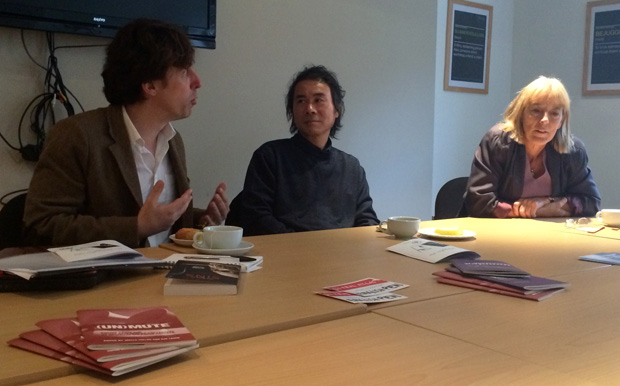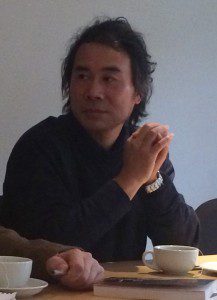19 Oct 2015 | Asia and Pacific, China, mobile, News and features

(Photo illustration: Shutterstock)
With UK-China relations warming, the president of the People’s Republic of China, Xi Jinping, will pay a state visit to the UK from 20-23 October. The UK government hopes the visit will help finalise multibillion-pound deals for Chinese state-owned companies to contribute to the building of two British nuclear power plants.
Many — including the Dalai Lama — are concerned that Prime Minister David Cameron and Chancellor George Osborne are putting the desire for profit above concern for human rights.
Xi may be staying in luxury at Buckingham Palace during his visit, but here are just five examples of how respect for free speech in China doesn’t get past the front door:
1. Locking up artists
The soccer-loving Chinese president is due to visit Manchester City Football Club’s stadium with Cameron during his visit. But will he make time for the new exhibition by Chinese artist and dissident Ai Weiwei in London? We won’t hold our breath.
The major retrospective of the artist’s work is currently on show at the Royal Academy of Arts. Ai — whose work is famous for addressing human rights abuses and corruption — has been harassed, beaten, placed under house arrest and imprisoned.
The current London exhibition almost didn’t go ahead as the British Embassy in Beijing turned down Ai’s request for a business visa in connection with his criminal conviction for tax fraud — an accusation he denies. British Home Secretary Theresa May eventually overturned the embassy’s decision, but only after a mass public outcry. This shouldn’t be the height of the British government’s efforts to address Chinese human rights abuses.
2. The use of online “opinion monitors”
China’s Terracotta Army, the 8,000-strong force of sculptures depicting warriors and horses, was purpose-built to protect emperor Qin Shi Huang, who died in 210 BC, in his afterlife. In the modern day, China’s army of “opinion monitors”, which has been purpose-built to protect China’s current leaders from criticism and dissent, dwarfs anything the Qin dynasty could muster.
Last year, Index on Censorship reported that the Chinese government is expanding its censorship and monitoring of web activity with a new training programme for an estimated two million flies on the firewall.
China’s hundreds of millions of web users increasingly use blogs to condemn the state, but posts are routinely deleted by government employees. In 2012, monitors banned more than 100 search terms relating to the 25th anniversary of the Tiananmen Square protest of 1989 and even shut down Google services.
3. Banning books
Often overshadowed by China’s internet censorship, we shouldn’t forget that Chinese authorities have a rich history of restricting free expression in literature. In 1931, Lewis Carroll’s Alice’s Adventures in Wonderland was banned for its portrayal of anthropomorphised animals for fear children would regard humans and animals as equal. During Chairman Mao Zedong’s Cultural Revolution, all aspects of arts and culture had to promote and aid the revolution. Libraries full of historical and foreign texts were destroyed and books deemed undesirable were burned.
The country’s post-Mao transition has been marked by a commitment to “modernising”. While the Chinese populace has access to more information than ever before, their leaders’ continuation of banning books on grounds of non-conformity and deviance are anything but modern.
Publications which are still banned — often for perceived politically incorrect content — include the memoirs of Li Rui, a retired Chinese politician and dissident who caused a stir in the CCP by calling for political reform; Lung Ying-tai’s Big River, Big Sea about the Chinese Civil War; and Jung Chang’s best-selling Wild Swans, a history that spans a century, recounting the lives of three female generations in the author’s family.
4. Detaining activists
Recent years have been marked with an intensification of the crackdown on dissent. On 6 March 2015, just days before International Women’s Day, the Chinese government detained a number of high-profile feminist activists. They were accused of creating a disturbance and, if convicted, could have received three-year prison sentences.
The women had been linked to several actions over the years which highlight issues such as domestic violence and the poor provision of women’s toilets, obvious embarrassments to the authorities.
As a result of their detention, China’s small, but increasingly vocal feminist movement was dealt a heavy blow. Demonstrations were cancelled and debate was effectively silenced. Five of the activists were released fairly quickly, but five more were in prison until 13 April, with two being denied treatment for serious medical conditions while in custody.
5. Repressing Uyghur Muslims
China continues to persecute the largely Muslim minority Uyghurs of Xinjiang. A tough system of policies and regulations deny Uyghurs religious freedom and by extension freedom of expression, association and assembly.
The abuse of national security and anti-terror laws to persecute Uyghurs and further deny them freedom of expression was highlighted in the recent ban by the Chinese authorities on 22 Muslim names in Xinjiang in an apparent attempt to discourage extremism among the region’s Uyghur residents. Many children were barred from attending school unless their names were changed.
Ryan McChrystal is the assistant online editor at Index on Censorship
26 Mar 2015 | Asia and Pacific, China, mobile, News and features
International Women’s Day 2015 should have been a positive occasion in China. The day is a big deal in the country; women are awarded time off work and given gifts by their employers. This year also marks 20 years since 189 countries adopted the Beijing Declaration and Platform for Action, a roadmap for women’s rights and empowerment. And in the lead-up to the day, a Chinese official hinted at the country’s first domestic violence law becoming a reality in August.
But events quickly took an ugly turn: on Friday 6 March the Chinese government detained a number of high-profile feminist activists. Demonstrations were cancelled. Debate was effectively silenced. Several weeks later five of the women are still in custody. Two have been denied treatment for serious medical conditions.
Superficially at least, these incidents represent a major blow to China’s feminist movement, which desperately relies on a small, but increasingly vocal cohort.
Chinese women suffer from a catalogue of discrimination in the workforce, in the home, and in most other aspects of their lives. Clear indication of the need for change came in 2013, when China only managed to reach position 91 out of the 187 countries listed in the United Nations Development Programme’s Gender Inequality Index (Iran came ahead at 75).
The injustices Chinese women face largely go unchallenged. The upper echelons of the Communist Party, where policy is made, is a man’s affair. Only two women belong to the current 25-member politburo, and none made it through to the seven member politburo standing committee.
The government plays an active role in skewing gender relations, as is demonstrated through the emergence of the idea of “leftover women”. The term first entered common parlance around 2007, when newspapers became filled with cautionary tales of unmarried women over the age of 27. Its roots can be traced back to the Chinese government, as Leta Hong Fincher explained in her groundbreaking book Leftover Women: The Resurgence of Gender Inequality in China. It has had a very negative impact on women’s property and employment rights.
It is the Communist Party’s ability to control conversations that makes the feminist struggle particularly pronounced in China. Civil society is tightly controlled. Certain groups do exist to campaign for female rights, but they are limited in size and reach.
In spite of these barriers, Chinese women have in recent years shown amazing strength to stand up to injustice. Activists have paraded around in blood coated wedding dresses, occupied men’s toilets, shaved their heads to raise awareness — to name just a few examples.
Some of these measures have proven highly effective. Cao Ju, a 21-year old university graduate, raised the profile of workforce quotas when she successfully sued a company that did not employ her on the grounds of her sex. Meanwhile, Kim Lee, who was abused for years by her famous husband Li Yang, shed a spotlight on how prolific domestic abuse is in China when she uploaded photos of her bloody face to microblogging platform Weibo.
For these reasons, the detentions are incredibly significant. Chinese women can’t rely on the government to come to their aid. But when it does the exact opposite, and actually arrests them, the situation gets a whole lot worse. China’s current leader Xi Jinping has intensified a crackdown on dissent. While they have not had an easy ride, feminist activists had until this month largely been spared. These arrests send out a warning to anyone who might follow suit and are a blatant attempt to squash the country’s nascent feminist movement.
On the other hand, some prominent commentators have argued that the detentions will instead cement the feminist movement in China. In a conversation published by ChinaFile, Leta Hong Fincher argues it could be “the spark” needed, while writer Eric Fish says the government “risks planting seeds that could sprout into even greater opposition later”. Sixteen activists have already gone to a Beijing detention centre where one of the women, Wu Rongrong, is being held to demand she be given medical treatment. A petition is also calling for the release of the activists.
China watchers wait with bated breathe to see how the story will unfold, pinning their hopes on a positive outcome. After all, China desperately needs figures such as these. Without them, no one is fighting in the corner of Chinese feminism.
This article was posted at Index on Censorship on 26 March 2015 | An modified version of this article appears at Huffington Post
23 Oct 2014 | China, Digital Freedom, News and features

(Image: Screengrab from linecorp.com/en/)
The instant messaging app LINE has strengthened its censorship methods in mainland China, according to new findings from the Citizen Lab at the University of Toronto. The academic researchers not only found proof that the app now censors more topics than ever before, but also that LINE is censoring in a way that is harder to detect for the average user.
Want to discuss the China’s ruling Communist Party (CPC) with your friends on LINE? Go ahead. Compare foreign leaders to dictators? No problem, chat away. Unless you mention both the CPC and dictatorship in one chat message, you won’t notice LINE’s new censorship policy. That’s because LINE recently “improved” its censorship methods in China by adding almost fifty so-called regular expressions to its long list of taboo subjects; that is, groups of words that users are allowed to use independently, but not in combination.
The findings are interesting because LINE’s novel use of regular expressions allows a more subtle form of censorship, argues Jason Q. Ng, one of the researchers at the University of Toronto. “It allows for a more nuanced censorship for topics such as Xinjiang, instead of just a blanket block,” he told Pao-Pao over the phone, referring to the western province which has long been plagued by tensions between Chinese authorities and the indigenous Uighur people.
That’s positive for the authorities, he explains: “If you hide a smaller set of things, less people will encounter censorship than if you block everything related to a certain topic. Many people might want to speak in a so-called ‘legitimate’ way on a topic like Xinjiang, so if [the censors] block everything related to the topic, it will just make those people curious about the censorship, and the reasons behind its existence.”
Ng says that he thinks that the new method of censorship will only hinder the small minority of people already aware of the existence of censorship. One of the new, blocked combinations of words on LINE includes “Xinjiang”(新疆)and “independent” (獨立). Similar censorship techniques have already been implemented on Weibo, also known as Chinese Twitter.
There’s a whimsical name for the phenomenon that the Chinese authorities are trying to avoid with these new techniques: the Streisand effect, after American singer Barbara Streisand. In 2003, she attempted to suppress photographs of her residence in Malibu, California by suing a photographer. The lawsuit ended up inadvertently generating a storm of publicity: whereas only six people had viewed the photographs before the lawsuits — two of which were her attorneys — the case caused 420,000 people to look up the photos within the month.
But it is a serious principle, as demonstrated earlier this month, during the protests in Hong Kong which were in a sense also a prime example of the dreaded Streisand effect. After a few students were teargassed by the police in an effort to suppress their protest, local outrage and support only swelled, resulting in a much higher turnout at demonstrations on the following days.
The Citizen Lab researchers have been tracking and analyzing LINE’s censorship for close to a year. They have reverse engineered the application, finding that when the user’s country is set to China it will enable censorship by downloading a list of banned words from a website called Naver. Whenever the list is updated, they study the differences compared to previous lists.
In a post on their website, Citizen Lab also show users how they can change their regional settings, allowing them to circumvent censorship on LINE within China.
In Citizen Lab’s report on the new methods, the researchers conclude that the new list “demonstrates LINE Corporation’s continued commitment to filtering keywords for users based in China and a push to improve the underlying technology”.
Still, Jason Q. Ng says that it is hard to say whether LINE’s censorship is better or worse than other chat apps like WeChat. “For LINE it is easier to see the exact way they censor,” he says. “Normally we can’t do that: we have to test the app word by word. We are still working on WeChat. Also, it depends on the way you measure: some apps might censor less, but have the ability to surveil a lot. That might be worse for the users.”
This article was originally published at pao-pao.net
6 Oct 2014 | China, News and features

From left to right: Harvey Tomlinson from MakeDo Publishing, Chen Xiwo and translator, Nicky Harman at English PEN. (Photo: Aimée Hamilton)
Chen Xiwo, described as “one of China’s most outspoken voices on freedom of expression for writers” by Asia Sentinel, has spoken about how he challenged the Chinese government’s decision to censor his latest book ahead of its launch in English.
The Book of Sins is a collection of seven novellas exploring controversial topics including rape, incest and S&M and examine the links between sexual and political deviance.
A heavily censored version of the book was published in China, in which parts of the text, including an entire novella, were removed.
Xiwo launched a case to sue China’s customs agency in an attempt to find out why his book, which was published in full in Taiwan, had been confiscated when it arrived in China in 2007. He was originally told that it was its dark and pornographic nature that had led to it being banned in its complete form.
In an unprecedented move, Xiwo took the customs office to court. He said in the history of the People’s Republic of China, since 1949, there has never been a case of a writer suing for not being allowed to publish a book.
Originally when the court hearings got underway the domestic news outlets were able to report on the progress until the propaganda ministry sent out an order forbidding further coverage.
During a meeting today run by English PEN at the Free Word Centre in London, Xiwo said: “These days these kind of orders are usually just made by phone call, so they won’t send an email where there’ll be a record, they do it by phone.
“This makes it even harder to get to the bottom of who’s banning what and why they’re doing it, because there’s no record.”

Chen Xiwo (Photo: Aimée Hamilton)
Eventually the court ruled that Xiwo’s case was a matter of national security, which ended further questions on the topic. In a blog entry for Free Word, Xiwo writes: “The Book of Sins had been impounded because it was deemed a threat to ‘national security’. In fact, they completely dropped the charge of obscenity. That meant they did not have to divulge any further information, or even say who had made the final decision.”
Xiwo’s book has now been translated into English by prolific translator Nicky Harman, who said: “Chen is a highly moral writer in my view. The sex and the small amount of violence, it’s never gratuitous. He really focuses on feelings, he has a good attitude towards women, he’s not misogynistic.”
One of the most provocative stories within the book, I Love My Mum, is about a disabled man who strikes up an incestuous relationship with his mother which ultimately ends in him murdering her. The novella is metaphorical of Chinese society and remains banned in the country.
When asked if he would challenge the banning of his books again, Xiwo said that it is inevitable future books of his will be banned, but he cannot launch a case for every one of them.
Although Chen Xiwo has written 10 books, he says only six or seven of these have been published in their complete form. The Book of Sins has won an English PEN award. Chen Xiwo will be launching the English translation of the book at Waterstones Piccadilly, tomorrow 7 October, at 7pm.
This article was posted on 6 October 2014 at indexoncensorship.org




